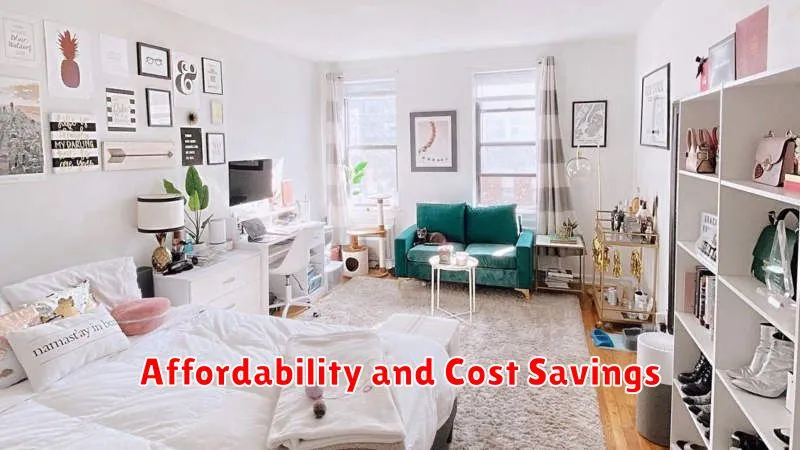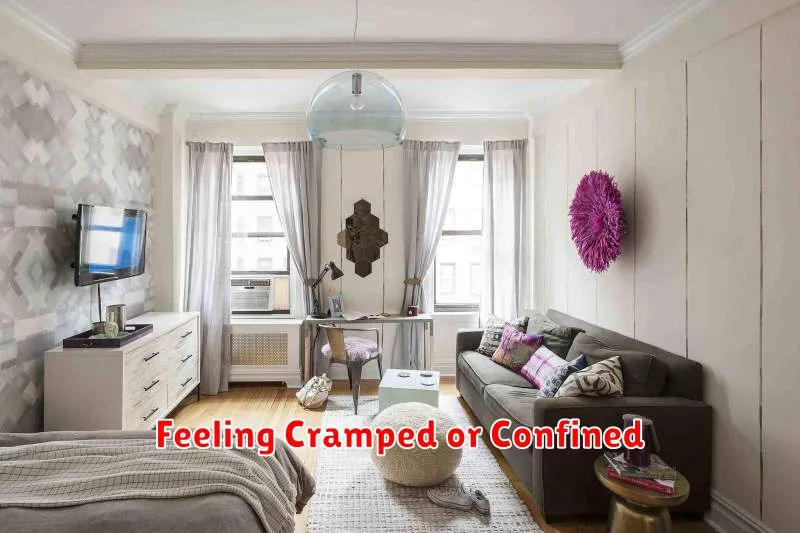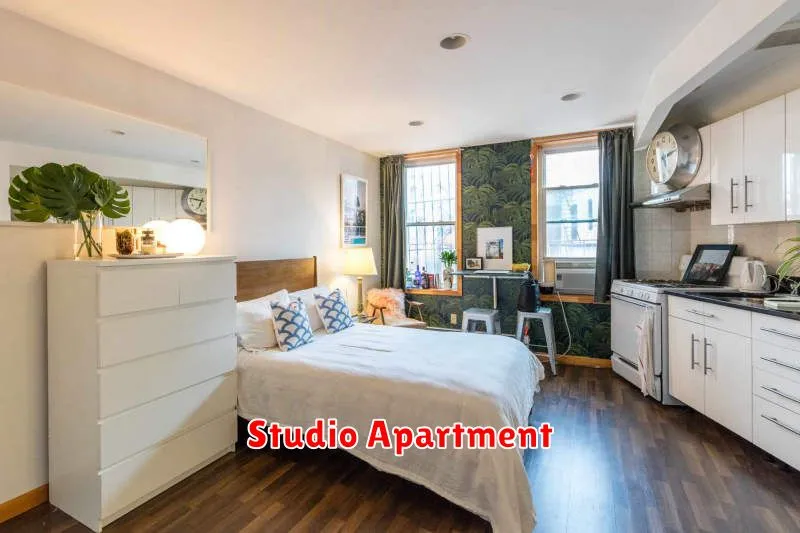Are you considering downsizing or moving to a new city and wondering if a studio apartment is right for you? Living in a studio apartment can be a great option for those seeking a minimalist lifestyle and affordable housing, but it also comes with its own set of challenges. This article will explore the pros and cons of living in a studio apartment, providing you with valuable insights to help you make an informed decision.
Affordability and Cost Savings

One of the most significant pros of living in a studio apartment is its affordability. Studios are generally the smallest and most basic apartment units, which translates to lower rent compared to larger apartments. This can be a huge cost-saving advantage, especially in expensive urban areas.
Furthermore, the compact nature of a studio can lead to reduced utility costs. With less space to heat or cool, you can potentially save on energy bills. Similarly, smaller living spaces often mean less furniture and appliances, which can also contribute to lower monthly expenses.
However, it’s essential to remember that the cost-savings of a studio apartment come with trade-offs. You’ll need to be comfortable living in a smaller space and may need to be more creative with storage solutions.
Space-Saving and Minimalist Living
One of the biggest advantages of studio apartments is the opportunity to embrace a minimalist lifestyle. The limited space encourages you to declutter and prioritize the items you truly need. This can lead to a sense of peace and tranquility, as you’re surrounded by only the essentials. It’s also an excellent way to save money, as you’ll be less inclined to purchase unnecessary items. Minimalism can also simplify your life, making it easier to clean and maintain your living space.
Living in a studio apartment can inspire creative solutions for maximizing space. You’ll learn to utilize every inch of your apartment effectively. This could involve adopting multi-functional furniture, implementing vertical storage systems, and getting creative with wall-mounted organizers. This forced efficiency can make you a master of space optimization.
Easy to Clean and Maintain
One of the biggest advantages of living in a studio apartment is the ease of cleaning and maintenance. With a smaller space, there’s less to clean and organize. You can quickly vacuum the floor, wipe down surfaces, and do laundry without spending hours on chores. This can be a huge time-saver, especially for busy individuals or those who prefer a minimalist lifestyle.
Furthermore, the compact nature of a studio apartment often encourages a decluttering mindset. You’re more likely to be selective about what you bring into your home, as space is limited. This can lead to a more organized and streamlined living environment, which is easier to keep clean.
The small space also means less room for dust and allergens to accumulate. This can be a significant benefit for people with allergies or sensitivities. With fewer surfaces and furniture to clean, you can achieve a cleaner and healthier living space with less effort.
Location Advantages in Urban Areas
Living in a studio apartment, especially in an urban area, offers several location advantages that can significantly enhance your lifestyle. Accessibility is one of the key benefits. You’ll be within easy reach of public transportation, restaurants, shops, and entertainment venues, making it convenient to access everything you need. This proximity to amenities reduces your reliance on cars, promotes a more sustainable lifestyle, and saves you time and money on transportation.
The vibrant atmosphere of city life is another advantage. You’ll be surrounded by a diverse community, offering a constant buzz and opportunities for social interaction. Living in a studio apartment in an urban area allows you to immerse yourself in the city’s culture, explore local events, and engage with people from all walks of life. This dynamic environment can be inspiring and enriching.
Moreover, the convenience of city living is undeniable. You’ll have access to numerous services and resources within walking distance, such as grocery stores, pharmacies, banks, and healthcare providers. This convenience eliminates the need for long commutes and saves you valuable time. You’ll have more opportunities to pursue your hobbies and interests outside of work or study.
Finally, living in an urban area often means being close to employment opportunities. This proximity to potential employers can make it easier to find a job, network with professionals, and advance your career. The city’s thriving job market can provide more options and better career prospects.
Limited Privacy
One of the biggest drawbacks of studio apartments is the lack of privacy. With everything in one space, it can be hard to have moments of solitude or to keep personal items private from guests or roommates. Even simple tasks like getting dressed or having a phone call can feel like an invasion of privacy. This can be especially challenging for people who value their alone time or have a busy schedule.
However, there are some ways to create a sense of privacy in a studio apartment. Using room dividers, curtains, or screens can help to create separate areas. You can also choose furniture that doubles as storage, such as a bed with built-in drawers or a sofa that converts into a bed. Ultimately, managing privacy in a studio apartment requires some creativity and effort.
Challenges with Storage Space
One of the biggest downsides of living in a studio apartment is the lack of storage space. With everything in one room, finding a place to keep your belongings can be a challenge. This can lead to clutter, which can make your apartment feel cramped and overwhelming. You might need to get creative with your storage solutions, such as using vertical space or under-bed storage.
Another challenge is the lack of dedicated areas for different activities. In a studio apartment, the kitchen, living room, and bedroom are all in the same room, which can make it difficult to create a sense of separation. You might find yourself tripping over your belongings when you’re trying to cook dinner or having difficulty relaxing in your living area because your bed is right next to the couch.
Overall, while studio apartments can be affordable and convenient, the lack of storage space can be a significant challenge. If you’re considering moving into a studio apartment, it’s important to think about how you will manage your belongings and create a functional living space.
Feeling Cramped or Confined

One of the biggest downsides of living in a studio apartment is the lack of space. With everything in one room, it can feel very cramped and confined, especially if you’re used to having separate rooms for different activities. This can be especially challenging if you have a lot of belongings, as you’ll need to find creative ways to store them. You might find yourself constantly tripping over furniture or having to move things around to make space for yourself. It can also be difficult to find a dedicated space to relax and unwind, as your bedroom, living room, and kitchen are all in the same space.
The lack of privacy can also be a major drawback. If you live with a roommate or partner, you’ll have to be mindful of their needs and schedules. It can be difficult to find moments of peace and quiet when you’re constantly surrounded by the same people.
Finally, the lack of separation between work and personal life can be a challenge. If you work from home, it can be hard to find a quiet space to focus. You may find yourself constantly distracted by the noise and activity around you.
Difficulty Hosting Guests
One of the biggest drawbacks of living in a studio apartment is the lack of space for hosting guests. With a limited square footage, you often have to be creative in finding ways to accommodate overnight visitors. For example, you might need to use a sofa bed or an air mattress, which can make it uncomfortable for your guests.
Beyond the lack of sleeping space, it can be hard to make your studio feel welcoming for company. It’s not uncommon for studios to have a single multi-functional space, which means there’s little privacy for guests. Also, if your studio apartment is small, guests might feel like they are “in your way,” which can create awkward situations.
Suitability for Single Occupancy
Studio apartments are generally considered ideal for single occupancy. Their compact size, efficient layout, and lower rent make them an attractive option for individuals seeking a manageable and affordable living space. The lack of separate bedrooms allows for a more open and spacious feel, while still providing a dedicated area for sleeping and relaxing. Additionally, single residents often appreciate the convenience of having all essential amenities within close proximity, minimizing the need for unnecessary movement and maximizing space utilization.
Decorating and Design Limitations
One of the most significant drawbacks of studio apartments is the limited space available for decorating and design. The lack of defined rooms and walls can make it challenging to create separate zones for different activities, like sleeping, working, and relaxing. You’ll need to get creative with furniture placement and utilize multi-functional pieces to maximize the space.
Limited wall space is another challenge. Hanging large artwork or installing shelves may not be feasible, especially if you have a small studio. This can limit your options for personalizing the space and creating a visually appealing environment. You might have to consider using smaller, more compact furniture and decor items to avoid overwhelming the space.
The open floor plan can also make it difficult to maintain privacy. While this can be advantageous for social gatherings, it can be challenging if you need some alone time or have roommates. If you’re concerned about privacy, consider using room dividers, curtains, or strategically placing furniture to create separate areas within the studio.
Noise and Disturbances
Living in a studio apartment means that you are living in one big room, which may also include a kitchen and bathroom. This lack of separation means that all noise is amplified. Any time someone is talking on the phone, watching TV, or even just moving around, it can be easily heard by other residents in the apartment. In some cases, this can be a major source of disturbance and stress. This is especially true if you live in a building with thin walls or neighbors who are loud. You may find yourself struggling to focus on work or sleep, as sounds from your neighbors can be difficult to ignore.

